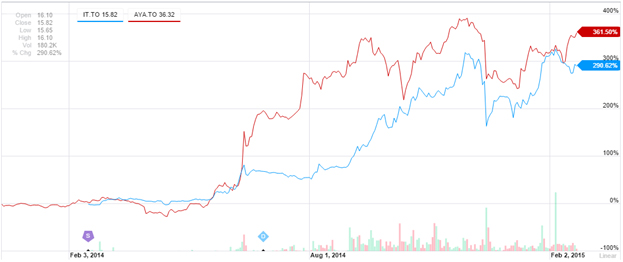 Let’s say that on January 1, 1967, you took out a 20-year mortgage for a $50,000 house and locked in a constant mortgage rate of 8%. Now let’s say a friend of yours took out the same mortgage for a house of the same price, but he brags to you that he only has to pay 5% because he’s paying a variable rate. What would happen is, 12 years later you’d still be paying 8%. Your friend will be paying 18% and probably be forced to sell the house for a loss so he can escape the mortgage payments.
Let’s say that on January 1, 1967, you took out a 20-year mortgage for a $50,000 house and locked in a constant mortgage rate of 8%. Now let’s say a friend of yours took out the same mortgage for a house of the same price, but he brags to you that he only has to pay 5% because he’s paying a variable rate. What would happen is, 12 years later you’d still be paying 8%. Your friend will be paying 18% and probably be forced to sell the house for a loss so he can escape the mortgage payments.
On a long term basis, this is how Intertain is setting itself up for stable growth. It’s paying higher financing costs now so it can grow faster in the future. Intertain has zero financing risk. All its risks are focused on the business side, which it has much more direct control over than the global economy. So for the next few years, earnings growth will be slow, but expenses will be more or less predictable. Net earnings will not shoot through the roof suddenly, but they will gradually move up year by year. Sometimes Intertain will show a small quarterly loss due to some impairment or other, but on the aggregate, the trend line will slowly turn up as cash flow and business expense race against each other, with cash flow just eking out a win.
It’s no secret that this has been Amaya’s strategy as well, except that Intertain is playing it even safer. Intertain is of course much smaller. Amaya is 9x Intertain’s size. Even before Amaya forked over $4.9B for Pokerstars and Full Tilt Poker and its market cap went on a 500% tear, it was still almost twice the size as Intertain is now, and both stocks have had nearly identical runs over the last year. In different fits and starts, yes, but on February 11th at least, the two stocks had posted identical gains of 296% since Intertain began trading last February.

Intertain’s equivalent of a PokerStars megadeal is its $653M acquisition of Gamesys and its collection of online gaming sites. Here is how they are funding it:
13% of the purchase price will be equity financed in new shares issued to Gamesys. Another $420M will be financed through “subscription receipts” to Gamesys, a sort of warrant at $15 per subscription receipt contingent on release conditions, convertible to shares at 1 to 1. The money to turn the
subscription receipt into a share is held in escrow in an interest bearing account at some bank in Canada until those conditions are met, at which point the receipts turn into shares and the holders of the receipts become shareholders. That brings the total up to $505M raised. The rest will come from around $150M in debt. As of last earnings statement, Intertain only had $4.7M Canadian in debt, all fixed, so this will bring debt to equity to 30%, a very manageable sum.
(I have not been able to find if the new debt the company is taking on will be fixed or floating, but judging by management behavior up to now, I assume fixed. If someone would like to go through the French statements and find out, let me know. My French isn’t up to par. Or even double bogey.)
The way Intertain financed this was quite ingenious. On the one hand it has protected against dilution of its share price and overburdening itself with debt by effectively placing shares in escrow. Funds will be released in May, at which point new revenues will start showing up on its statements, which will help counteract the dilutive effects of the new shares. At the same time, the funds will be earning interest until then in a Canadian bank.
We’ve seen what bad financing looks like with Caesars, now in default. Intertain is the opposite extreme. Its moves look very good, but as for stock price movements, that is more complicated. Global politics right now are so unstable both with the Eurozone and Russia that the only thing I’m confident in saying is that Intertain will outperform other gaming stocks in its niche over the long term. If Greece exits the Eurozone at the end of the month (Germany may determine that even today) then everything will tailspin who knows how far down. A chart of Intertain still shows quite a bit of volatility from a high of $17.73 to a low of $9.20 (a 48% swing in two weeks) which means there is quite a bit of speculative hot money in the stock that just chases headlines.
Intertain is a good company, but macro conditions right now are too dicey to take any positions. When the dust settles and we know one way or the other what happens with the Euro and what happens when and if the Fed raises interest rates, Intertain will be a top pick.